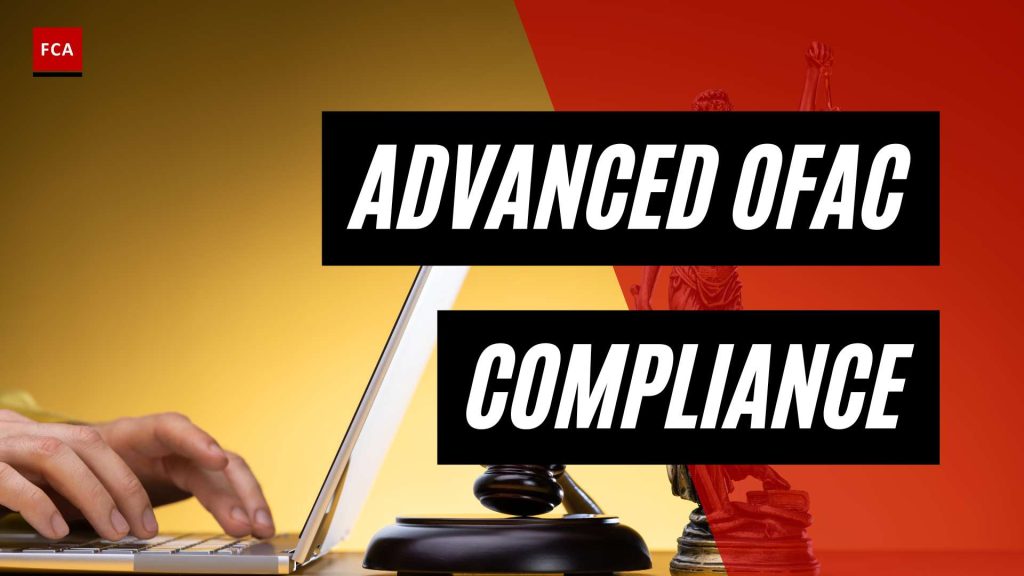Understanding OFAC Compliance
Compliance with the regulations set forth by the Office of Foreign Assets Control (OFAC) is essential for organizations operating within the United States. Failure to adhere to OFAC compliance policies can lead to severe consequences, including fines, penalties, criminal prosecution, and reputational damage. In this section, we will explore the basics of OFAC compliance, including what OFAC is, the importance of compliance, and the consequences of non-compliance.
What is OFAC?
The Office of Foreign Assets Control (OFAC) is an agency of the U.S. Department of the Treasury. It administers and enforces economic and trade sanctions based on U.S. foreign policy and national security goals. OFAC maintains a list of individuals, companies, and countries subject to sanctions, known as the OFAC sanctions list. Organizations must comply with OFAC regulations to ensure they do not engage in transactions or dealings with sanctioned individuals or entities.
Importance of OFAC Compliance
Compliance with OFAC regulations is crucial for organizations to avoid legal and financial repercussions. By adhering to OFAC compliance policies, organizations demonstrate their commitment to ethical business practices, risk management, and the prevention of illicit financial activities. Maintaining OFAC compliance also safeguards organizations from reputational damage that could result from association with sanctioned individuals or entities.
Organizations are responsible for implementing an effective OFAC compliance program that aligns with regulatory requirements and industry best practices. This includes tailoring compliance programs to their specific needs, conducting risk assessments, and providing employee training and education to ensure awareness of sanctions regulations.
Consequences of Non-Compliance
Non-compliance with OFAC regulations can have serious consequences for organizations. Violations can result in civil and criminal penalties, including fines, imprisonment, and forfeiture of assets. The fines for OFAC violations can be substantial, with civil and criminal penalties that can exceed several million dollars. The exact penalties vary depending on the specific sanctions program and the severity of the violation. It’s important to note that civil penalties are subject to annual adjustments based on the Federal Civil Penalties Inflation Adjustment Act of 1990 (OFAC – U.S. Department of the Treasury).
In addition to financial penalties, non-compliance with OFAC regulations can lead to reputational damage and loss of business opportunities. Organizations that fail to maintain OFAC compliance risk significant harm to their brand image and integrity. Therefore, it is essential for organizations to prioritize OFAC compliance and implement robust compliance policies to mitigate the risk of non-compliance.
Understanding the importance of OFAC compliance, organizations should strive to establish comprehensive compliance programs, conduct regular screenings and monitoring, utilize software tools to streamline compliance efforts, and perform due diligence on business partners. By doing so, organizations can effectively navigate the complex landscape of OFAC regulations and mitigate the risk of non-compliance.
Building an Effective OFAC Compliance Program
To ensure compliance with OFAC sanctions and mitigate the risk of violations, companies need to establish and maintain an effective OFAC compliance program. This program should be tailored to the company’s specific risk profile and incorporate measures to address potential compliance issues. The key elements of an effective OFAC compliance program include tailoring compliance programs, conducting risk assessments, and providing employee training and education.
Tailoring Compliance Programs
According to OFAC, compliance programs should be tailored to a company’s risk profile. This means that companies should review and assess their compliance policies and procedures and update them when necessary. The program should be designed to address the specific risks associated with the company’s product offerings, customer base, suppliers, geographic location, and other relevant factors. It should also consider the involvement of third parties, such as screening partners or customers.
By tailoring the compliance program, companies can focus their efforts on the areas that pose the greatest risk and allocate resources accordingly. This approach allows companies to develop targeted controls and measures to address specific compliance challenges.
Conducting Risk Assessments
Risk assessments play a crucial role in an effective OFAC compliance program. Companies are expected to perform risk assessments to identify potential OFAC violations and take steps to mitigate these risks. The risk assessment should be comprehensive and consider various factors related to the company’s operations and business environment.
According to OFAC, risk assessments should take into account the company’s product offerings, customer base, suppliers, geographic location, and other relevant factors. It should also consider the involvement of third parties, such as screening partners or customers. By conducting a thorough risk assessment, companies can identify areas of potential vulnerability and implement appropriate controls to mitigate those risks.
Employee Training and Education
Effective employee training and education are essential components of an OFAC compliance program. Companies are encouraged to provide regular training to their employees on OFAC compliance requirements and best practices. The training program should be tailored to the company’s specific risks and business operations.
Employees should be educated on the company’s policies and procedures related to OFAC compliance, as well as the potential consequences of non-compliance. They should also receive guidance on how to identify and respond to potential violations promptly. By ensuring that employees are knowledgeable about OFAC regulations and their responsibilities, companies can foster a culture of compliance and reduce the risk of violations.
Additionally, companies should maintain documentation of the training provided to employees as part of their compliance records. This documentation serves as evidence of the company’s commitment to compliance and can be valuable in demonstrating compliance efforts to regulators, if necessary.
By focusing on tailoring compliance programs, conducting risk assessments, and providing employee training and education, companies can build an effective OFAC compliance program. Implementing these key elements helps ensure that the company is equipped to identify and mitigate potential compliance risks, enhance regulatory compliance, and safeguard the company’s reputation and integrity.
Key Elements of OFAC Compliance Policies
To ensure effective compliance with Office of Foreign Assets Control (OFAC) sanctions, organizations must incorporate key elements into their compliance policies. These elements include regular screening and monitoring, utilizing software tools, and due diligence on business partners.
Regular Screening and Monitoring
Regular screening and monitoring are crucial components of an effective OFAC compliance program. Organizations should check the OFAC sanctions list on a regular basis to ensure compliance with sanctions laws and avoid costly penalties. The frequency of these checks may vary depending on the organization’s risk profile, with monthly checks being the gold standard for most organizations (ProviderTrust).
By conducting regular screenings, organizations can identify any individuals, entities, or countries that are subject to OFAC restrictions. This allows them to take necessary actions to prevent prohibited transactions and ensure compliance with OFAC regulations.
Utilizing Software Tools
Many organizations choose to utilize software tools that automate the screening process, streamlining compliance efforts and reducing the risk of oversight or human error in OFAC checks. These software tools can help organizations efficiently scan their customer databases against the OFAC sanctions lists. By automating the screening process, organizations can enhance accuracy, save time, and facilitate a more robust compliance program (ProviderTrust).
When selecting software tools, organizations should consider their specific needs and seek guidance from other banks and vendors to assess the most suitable option. Commercially available software packages can assist in compliance by providing advanced search capabilities and ensuring comprehensive screening against the OFAC sanctions lists.
Due Diligence on Business Partners
Conducting due diligence on business partners is another essential element of an effective OFAC compliance policy. Organizations should thoroughly vet their business partners, including suppliers, customers, and third-party intermediaries, to ensure they are not involved in any prohibited activities or transactions.
Due diligence on business partners involves conducting background checks, reviewing relevant documentation, and assessing the business’s reputation and integrity. This process helps organizations identify any potential risks and ensure that they are not engaging in transactions with individuals or entities on the OFAC sanctions list.
By integrating due diligence procedures into their compliance policies, organizations can mitigate the risk of unwittingly entering into prohibited transactions and maintain a strong culture of compliance.
By incorporating these key elements into their OFAC compliance policies, organizations can enhance their ability to identify and prevent transactions with sanctioned individuals, entities, or countries. Regular screening and monitoring, utilization of software tools, and due diligence on business partners are essential components of a comprehensive compliance program. Compliance with OFAC regulations is crucial for organizations to safeguard their reputation, integrity, and financial well-being.
OFAC Compliance Best Practices
To ensure effective compliance with OFAC sanctions and maintain a strong regulatory framework, organizations should implement best practices to elevate their OFAC compliance policies. This section highlights three essential best practices: keeping up with regulatory changes, ongoing auditing and review, and the importance of a prompt response to potential violations.
Keeping Up with Regulatory Changes
Regulatory requirements and sanctions lists are subject to frequent updates and changes. It is crucial for organizations to stay informed about these changes to ensure ongoing compliance with OFAC regulations. Regularly monitoring updates from OFAC and other reliable sources helps organizations understand new sanctions, changes to prohibited countries, and updates to the OFAC sanctions list.
By keeping up with regulatory changes, organizations can promptly adjust their compliance policies and procedures to align with the latest requirements. This proactive approach demonstrates a commitment to compliance and helps mitigate the risk of inadvertent violations.
Ongoing Auditing and Review
To ensure compliance with OFAC regulations, organizations must conduct ongoing auditing and review of their compliance programs. This practice involves regular assessments and evaluations of the effectiveness of policies, procedures, and internal controls. Ongoing auditing and review help identify any potential violations or gaps in compliance, allowing organizations to take corrective actions promptly.
By incorporating regular auditing and review into their compliance programs, organizations can proactively identify and address areas of non-compliance. This practice helps maintain the integrity of the OFAC compliance framework and ensures that organizations meet their compliance obligations. Additionally, conducting risk assessments (ofac risk assessment) during the auditing process helps organizations identify and prioritize potential risks associated with their operations.
Importance of Prompt Response to Potential Violations
Prompt response to potential OFAC violations is crucial for maintaining compliance and mitigating risks. When organizations become aware of a potential violation, it is essential to take immediate action to investigate the situation, assess the scope of the violation, and implement appropriate remedial measures.
Promptly responding to potential violations demonstrates a commitment to OFAC compliance and responsible business practices. It also helps prevent further non-compliance and mitigate potential penalties. Organizations should establish clear procedures and protocols for responding to potential violations, ensuring that they address and rectify any non-compliance swiftly.
By consistently adhering to these best practices, organizations can strengthen their OFAC compliance programs and minimize the risk of non-compliance. Implementing these practices as part of an overall compliance strategy helps organizations maintain a robust and effective OFAC compliance framework.
OFAC Penalties and Enforcement Actions
When it comes to OFAC compliance, understanding the potential penalties and enforcement actions is of utmost importance. Violations of OFAC sanctions can result in severe consequences, including civil and criminal penalties, fines, imprisonment, and asset forfeiture (Dow Jones). In this section, we will explore an overview of OFAC penalties, recent trends in enforcement, and the importance of safeguarding reputation and integrity.
Overview of OFAC Penalties
Non-compliance with OFAC sanctions can lead to significant penalties and legal repercussions. The fines imposed for OFAC violations can be substantial, with civil and criminal penalties that can exceed several million dollars. Civil penalties vary by sanctions program, and the Federal Civil Penalties Inflation Adjustment Act of 1990 requires OFAC to adjust civil monetary penalty amounts annually (OFAC – U.S. Department of the Treasury).
The penalties for non-compliance are not limited to financial consequences alone. They can also result in reputational damage, loss of business opportunities, and even criminal charges. It is essential for organizations to prioritize strict adherence to OFAC compliance policies to avoid these penalties and uphold ethical business practices.
Recent Trends in OFAC Enforcement
In recent years, there has been an increase in OFAC enforcement actions, with substantial penalties imposed on violators. This trend underscores the necessity for businesses to prioritize OFAC compliance and continuously update their policies to align with changing regulatory requirements (Dow Jones). Staying up to date with the latest regulatory developments and trends in OFAC enforcement is crucial for organizations to avoid potential violations.
Safeguarding Reputation and Integrity
Aside from the financial and legal consequences, maintaining a strong reputation and high ethical standards is paramount for organizations. OFAC compliance policies play a crucial role in safeguarding the reputation and integrity of businesses. By implementing effective compliance measures, organizations can mitigate risks, demonstrate a commitment to regulatory compliance, and uphold responsible business practices.
Effective OFAC compliance programs should include regular risk assessments, employee training and education, regular screening and monitoring, and due diligence on business partners. These elements, along with ongoing auditing and review, help organizations stay vigilant and ensure compliance with OFAC sanctions. Prompt response to potential violations is also critical to address any compliance issues swiftly and mitigate potential damages.
By understanding the potential penalties, staying informed about recent trends in OFAC enforcement, and prioritizing reputation and integrity, organizations can enhance their OFAC compliance efforts. This commitment to compliance helps organizations maintain a strong ethical foundation, avoid penalties, and build trust with stakeholders.
History and Evolution of OFAC
To fully grasp the significance of OFAC compliance and its role in international finance, it’s important to understand the history and evolution of the Office of Foreign Assets Control (OFAC). This section will explore the origins of OFAC, its development during World War II, and its formal establishment during the Korean War.
Origins of OFAC
The origins of OFAC can be traced back to the Office of Foreign Funds Control (FFC), which was established during World War II. The FFC was created in response to the German invasion of Norway in 1940. Its primary objective was to prevent the Nazis from using the foreign exchange and securities of occupied countries, as well as to protect the funds of nationals from those countries. By doing so, the FFC aimed to impede enemy access to financial resources and hinder their war efforts (OFAC – United States Department of the Treasury).
Development during World War II
As World War II progressed, the FFC expanded its controls to safeguard the assets of other invaded countries. It played a crucial role in economic warfare against the Axis powers by blocking enemy assets and imposing restrictions on foreign trade and financial transactions. The FFC’s efforts were instrumental in impeding the financial capabilities of the Axis powers and supporting the Allied forces’ war efforts (OFAC – United States Department of the Treasury).
Formal Establishment and Korea War Declaration
In December 1950, during the Korean War, President Truman declared a national emergency. This declaration led to the blocking of all Chinese and North Korean assets under U.S. jurisdiction. It marked a significant turning point in the establishment of the Office of Foreign Assets Control (OFAC) as a distinct entity within the U.S. Department of the Treasury. OFAC’s role was to administer and enforce economic and trade sanctions, ensuring compliance with U.S. foreign policy objectives and national security interests (OFAC – United States Department of the Treasury).
Understanding the history and evolution of OFAC provides essential context for comprehending its current role and significance in international finance. As OFAC continues to adapt to evolving geopolitical landscapes, it remains a vital component of global efforts to combat illicit financial activities and maintain economic stability.









